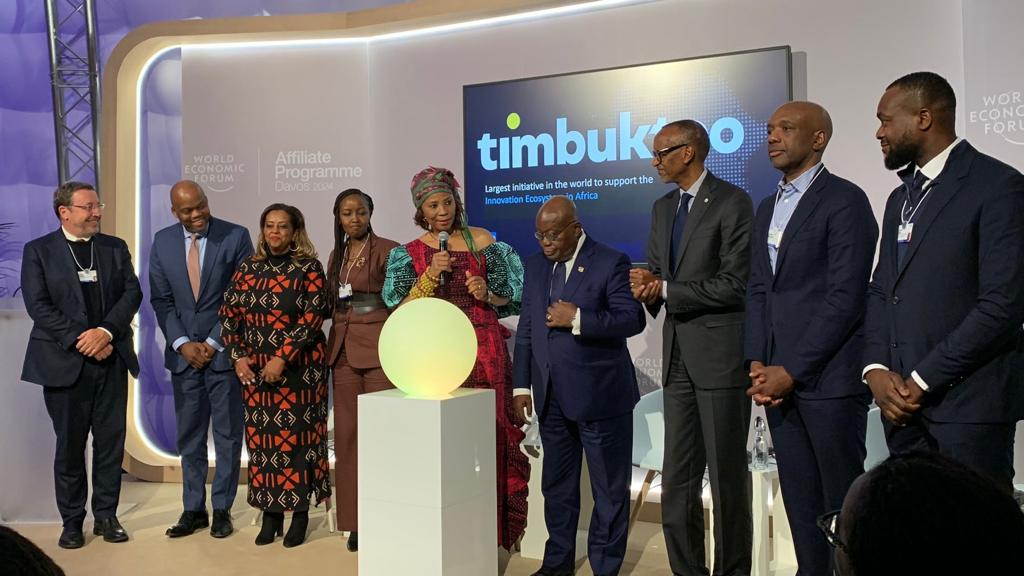At the World Economic Forum in Davos, the UNDP and African leaders unveiled a new initiative that promises to transform the startup ecosystem on the continent and generate millions of jobs.
The initiative named ‘Timbuktoo’ is the largest financing facility in the world, specifically designed to assist African businesses. It seeks to raise $1 billion in capital to support creative companies that can take advantage of the opportunities and problems facing the continent.
With its headquarters in Kigali, Rwanda, the Timbuktoo Africa Innovation Fund will offer commercial and catalytic funding to reduce the risk associated with private investment and help scale up profitable enterprises.
Read also: Four Nigerian startups to headline Africa Tech Summit
Paul Kagame, the President of Rwanda, accompanied by Ghana’s President Nana Akufo-Addo, Wamkele Mene, the Secretary-General of the African Continental Free Trade Area Secretariat, and Achim Steiner, the UNDP Administrator, launched the fund at a special session in Davos with a US$3 million donation.
Timbuktoo, a comprehensive strategy to support Africa’s startup ecosystem, is more than simply a fund. It’s a pan-African approach to supporting the continent’s startup ecosystem as a whole. In order to promote an atmosphere that is favourable for innovation and entrepreneurship, the initiative will collaborate with governments, investors, corporations, and academic institutions.
Among the essential elements of timbuktoo are:
Legislation that is conducive to startups: Timbuktoo will assist African nations in adopting and putting into effect laws and policies that permit and encourage entrepreneurs to function and expand.
World-class startup building: To assist African entrepreneurs in developing and improving their goods, services, and business models, Timbuktoo will give them access to top-notch networks, mentors, and resources.
UniPods (University Innovation Pods): Timbuktoo will develop hubs of learning and innovation in universities around Africa, enabling staff and students to work together, try new things, and come up with answers to regional and global problems.
A blueprint for the knowledge-driven economy of Africa
Timbuktoo is motivated by the idea that Africa may become a knowledge-based economy where ideas can become pan-African businesses that draw both domestic and foreign investment. The programme aims to utilise and fund the youthful demography and inventive potential on the continent, which are presently underutilised.
Africa only accounts for 0.2% of the global startup value, and 89% of venture financing originates from outside, with 83% of that coming from four nations, according to the UNDP. Timbuktoo aspires to improve 100 million livelihoods and create 10 million new jobs by 2022, with a youthful population, growing tech startups, and private venture capital investments in Africa growing six times faster than the world average.
Global business executives and African financial institutions showed their interest in and commitment to supporting timbuktoo and its beneficiaries at the initiative’s inception. Timbuktoo is predicted to revolutionise the African startup scene by enabling the continent’s full creative and impact potential.
African startups achieving success
Numerous prosperous African startups are having an influence on a range of markets and industries. Here are a few instances:
Okra: A fintech firm based in Nigeria that offers an API to link bank accounts to applications and companies. In 2020, Okra secured US$3.5 million in seed capital and was named one of the Technology Pioneers of 2022 by the World Economic Forum.
Sendy is a logistics startup based in Kenya that links consumers and companies with delivery drivers and riders. Sendy, which has operations in Kenya, Uganda, Tanzania, and Nigeria, raised US$20 million in Series B funding in 2020.
Pula is a Kenyan insurtech company that provides smallholder farmers with digital solutions and insurance. Serving over 5 million farmers across 13 African and Asian nations, Pula secured US$6 million in Series A funding in 2021.
Ejara is a fintech firm based in Cameroon that provides a mobile application for investing in cryptocurrencies and other virtual assets. Ejara was chosen as one of the World Economic Forum’s Technology Pioneers of 2022 and raised US$2 million in pre-seed capital in 2021.
Ampersand is an electric motorbike and charging station manufacturer and operator based in Rwanda. In 2021, Ampersand secured US$3.5 million in Series A funding with the objective of electrifying African transportation.




